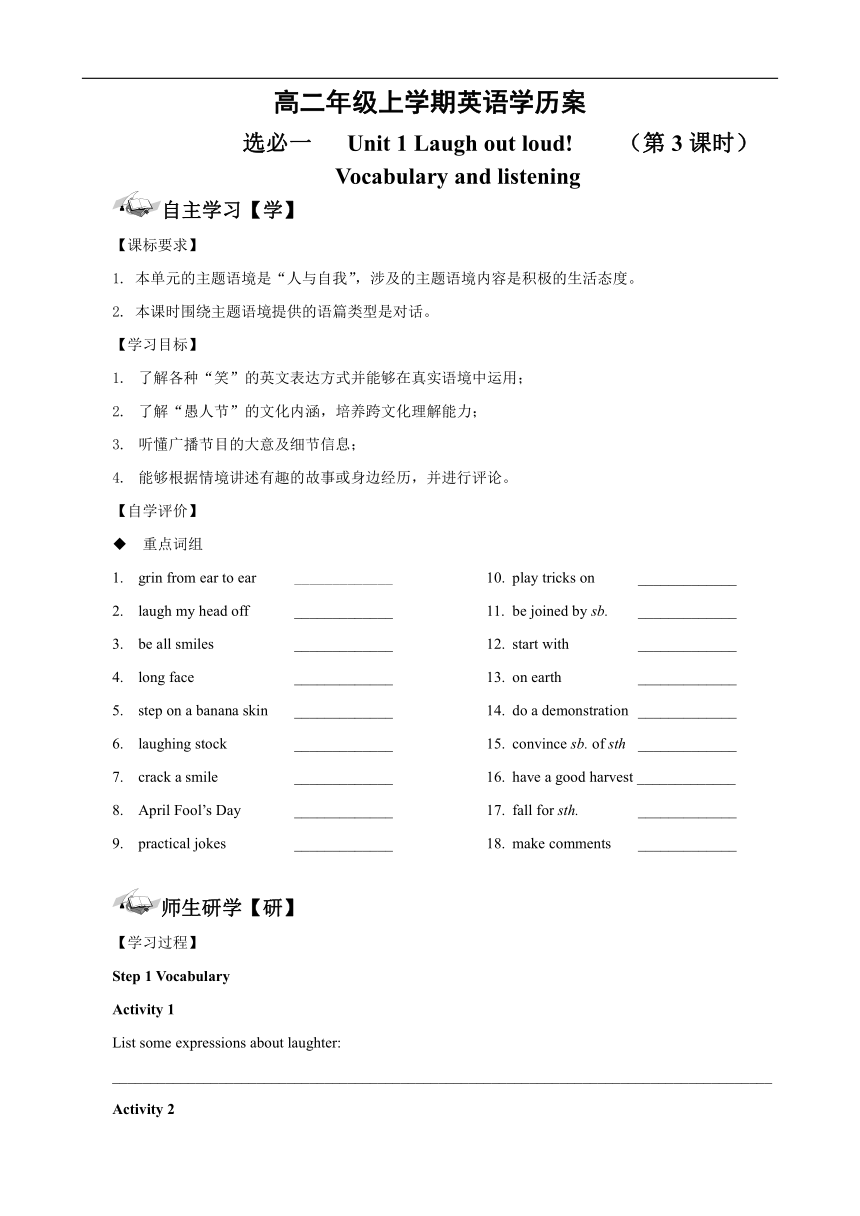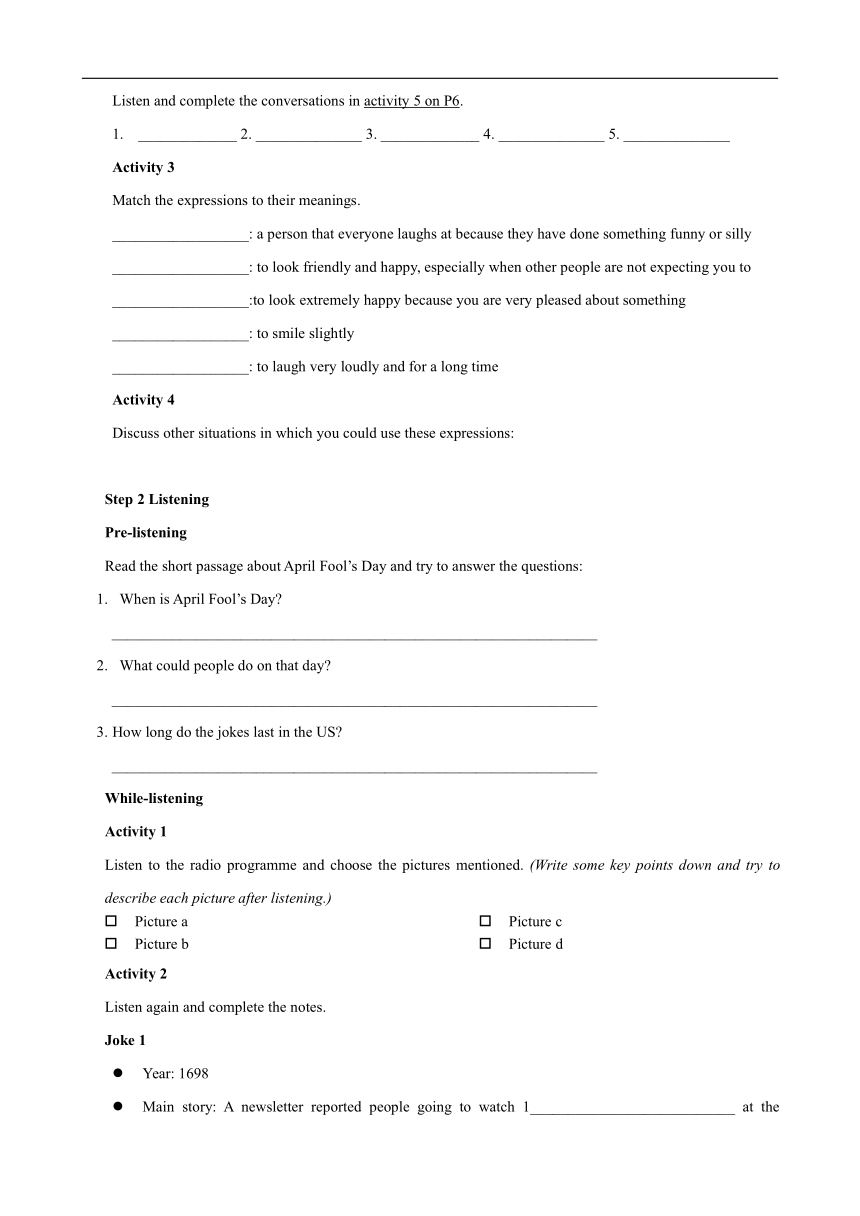外研版(2019)选择性必修 第一册Unit 1 Laugh out loud! Vocabulary and listening 学历案(无答案)
文档属性
| 名称 | 外研版(2019)选择性必修 第一册Unit 1 Laugh out loud! Vocabulary and listening 学历案(无答案) |

|
|
| 格式 | docx | ||
| 文件大小 | 29.9KB | ||
| 资源类型 | 教案 | ||
| 版本资源 | 外研版(2019) | ||
| 科目 | 英语 | ||
| 更新时间 | 2024-03-20 00:00:00 | ||
图片预览


文档简介
高二年级上学期英语学历案
选必一 Unit 1 Laugh out loud! (第3课时)
Vocabulary and listening
自主学习【学】
【课标要求】
1. 本单元的主题语境是“人与自我”,涉及的主题语境内容是积极的生活态度。
2. 本课时围绕主题语境提供的语篇类型是对话。
【学习目标】
了解各种“笑”的英文表达方式并能够在真实语境中运用;
了解“愚人节”的文化内涵,培养跨文化理解能力;
听懂广播节目的大意及细节信息;
能够根据情境讲述有趣的故事或身边经历,并进行评论。
【自学评价】
重点词组
grin from ear to ear _____________
laugh my head off _____________
be all smiles _____________
long face _____________
step on a banana skin _____________
laughing stock _____________
crack a smile _____________
April Fool’s Day _____________
practical jokes _____________
play tricks on _____________
be joined by sb. _____________
start with _____________
on earth _____________
do a demonstration _____________
convince sb. of sth _____________
have a good harvest _____________
fall for sth. _____________
make comments _____________
师生研学【研】
【学习过程】
Step 1 Vocabulary
Activity 1
List some expressions about laughter:
_______________________________________________________________________________________
Activity 2
Listen and complete the conversations in activity 5 on P6.
_____________ 2. ______________ 3. _____________ 4. ______________ 5. ______________
Activity 3
Match the expressions to their meanings.
__________________: a person that everyone laughs at because they have done something funny or silly
__________________: to look friendly and happy, especially when other people are not expecting you to
__________________:to look extremely happy because you are very pleased about something
__________________: to smile slightly
__________________: to laugh very loudly and for a long time
Activity 4
Discuss other situations in which you could use these expressions:
Step 2 Listening
Pre-listening
Read the short passage about April Fool’s Day and try to answer the questions:
When is April Fool’s Day
________________________________________________________________
What could people do on that day
________________________________________________________________
How long do the jokes last in the US
________________________________________________________________
While-listening
Activity 1
Listen to the radio programme and choose the pictures mentioned. (Write some key points down and try to describe each picture after listening.)
Picture a
Picture b
Picture c
Picture d
Activity 2
Listen again and complete the notes.
Joke 1
Year: 1698
Main story: A newsletter reported people going to watch 1___________________________ at the Tower of London. The joke was played on visitor throughout the 2__________________________.
Joke 2
Year: 3________________
Main story: The 4___________________ introduced an invention called “Smellovision”. It allowed
5______________________ over the airwaves.
Joke 3
Year: 6_______________
Main story: A news programme told viewers that the spaghetti trees in Switzerland were having 7____________________.
Post-listening
Activity 1
Which of the practical jokes do you think funny Why
____________________________________________________________________________________
Activity 2
Read the following expressions and divide them into two groups:
Let’s start with…
I don’t get it.
Now, my favourite one …
It’s a good one!
That’s so funny!
I can imagine!
Telling a story Making comments
Step 3 Speaking
Work in pairs. Student A tells a funny story and student B tries to make a comment on it.
训练提升【练】
【当堂检测】
翻译句子
无论什么时候看《憨豆先生》这部电影,我都会笑得前仰后合。(laugh one’s head off)
_________________________________________________________________________________
一听到这个消息,他们突然大笑起来。(burst out)
________________________________________________________________________________
我认为这个建议值得认真考虑。(deserve)
________________________________________________________________________________
在愚人节,给老师开玩笑也是无关紧要的。(play tricks on)
________________________________________________________________________________
从他脸上困惑的表情,我猜想他没有理解。(get it)
________________________________________________________________________________
阅读语篇内容填空。
The British opinion about humor may make people feel 1. ______________(puzzle) at first. British humor can feel like 2. ___________ whole new language. But don’t worry. We’ve put together a beginner’s guide foe foreigners. The key to 3. ______________(understand) British humor is knowing not to take yourself too 4. ______________(serious). Our humor is to pay special attention 5. ________ our own faults or weakness. We joke about our families so as to appear more friendly.
British people are famous for having great 6. ______________(polite), but a sign that a British likes you is that he/she happily offends(冒犯)you with interesting remarks. An important part of mastering British humor is judging 7. _________ the people you are with find funny.
Humor 8. ______________(use) by British people to lighten even the most unfortunate, unhappy moments. There are few subjects we don’t joke about. We don’t have a plan 9. ______________(shock) others and make others unhappy. British people only turn to laughter as a form of medicine when life knocks them. Bad luck and failure 10. ______________(be) ordinary in British comedy— if the jokes are proper for the situation. In most cultures, there is a time and place for humor. In Britain, this is not the case.
【布置作业】
____________________________________________________________________________________
师生总结【结】
选必一 Unit 1 Laugh out loud! (第3课时)
Vocabulary and listening
自主学习【学】
【课标要求】
1. 本单元的主题语境是“人与自我”,涉及的主题语境内容是积极的生活态度。
2. 本课时围绕主题语境提供的语篇类型是对话。
【学习目标】
了解各种“笑”的英文表达方式并能够在真实语境中运用;
了解“愚人节”的文化内涵,培养跨文化理解能力;
听懂广播节目的大意及细节信息;
能够根据情境讲述有趣的故事或身边经历,并进行评论。
【自学评价】
重点词组
grin from ear to ear _____________
laugh my head off _____________
be all smiles _____________
long face _____________
step on a banana skin _____________
laughing stock _____________
crack a smile _____________
April Fool’s Day _____________
practical jokes _____________
play tricks on _____________
be joined by sb. _____________
start with _____________
on earth _____________
do a demonstration _____________
convince sb. of sth _____________
have a good harvest _____________
fall for sth. _____________
make comments _____________
师生研学【研】
【学习过程】
Step 1 Vocabulary
Activity 1
List some expressions about laughter:
_______________________________________________________________________________________
Activity 2
Listen and complete the conversations in activity 5 on P6.
_____________ 2. ______________ 3. _____________ 4. ______________ 5. ______________
Activity 3
Match the expressions to their meanings.
__________________: a person that everyone laughs at because they have done something funny or silly
__________________: to look friendly and happy, especially when other people are not expecting you to
__________________:to look extremely happy because you are very pleased about something
__________________: to smile slightly
__________________: to laugh very loudly and for a long time
Activity 4
Discuss other situations in which you could use these expressions:
Step 2 Listening
Pre-listening
Read the short passage about April Fool’s Day and try to answer the questions:
When is April Fool’s Day
________________________________________________________________
What could people do on that day
________________________________________________________________
How long do the jokes last in the US
________________________________________________________________
While-listening
Activity 1
Listen to the radio programme and choose the pictures mentioned. (Write some key points down and try to describe each picture after listening.)
Picture a
Picture b
Picture c
Picture d
Activity 2
Listen again and complete the notes.
Joke 1
Year: 1698
Main story: A newsletter reported people going to watch 1___________________________ at the Tower of London. The joke was played on visitor throughout the 2__________________________.
Joke 2
Year: 3________________
Main story: The 4___________________ introduced an invention called “Smellovision”. It allowed
5______________________ over the airwaves.
Joke 3
Year: 6_______________
Main story: A news programme told viewers that the spaghetti trees in Switzerland were having 7____________________.
Post-listening
Activity 1
Which of the practical jokes do you think funny Why
____________________________________________________________________________________
Activity 2
Read the following expressions and divide them into two groups:
Let’s start with…
I don’t get it.
Now, my favourite one …
It’s a good one!
That’s so funny!
I can imagine!
Telling a story Making comments
Step 3 Speaking
Work in pairs. Student A tells a funny story and student B tries to make a comment on it.
训练提升【练】
【当堂检测】
翻译句子
无论什么时候看《憨豆先生》这部电影,我都会笑得前仰后合。(laugh one’s head off)
_________________________________________________________________________________
一听到这个消息,他们突然大笑起来。(burst out)
________________________________________________________________________________
我认为这个建议值得认真考虑。(deserve)
________________________________________________________________________________
在愚人节,给老师开玩笑也是无关紧要的。(play tricks on)
________________________________________________________________________________
从他脸上困惑的表情,我猜想他没有理解。(get it)
________________________________________________________________________________
阅读语篇内容填空。
The British opinion about humor may make people feel 1. ______________(puzzle) at first. British humor can feel like 2. ___________ whole new language. But don’t worry. We’ve put together a beginner’s guide foe foreigners. The key to 3. ______________(understand) British humor is knowing not to take yourself too 4. ______________(serious). Our humor is to pay special attention 5. ________ our own faults or weakness. We joke about our families so as to appear more friendly.
British people are famous for having great 6. ______________(polite), but a sign that a British likes you is that he/she happily offends(冒犯)you with interesting remarks. An important part of mastering British humor is judging 7. _________ the people you are with find funny.
Humor 8. ______________(use) by British people to lighten even the most unfortunate, unhappy moments. There are few subjects we don’t joke about. We don’t have a plan 9. ______________(shock) others and make others unhappy. British people only turn to laughter as a form of medicine when life knocks them. Bad luck and failure 10. ______________(be) ordinary in British comedy— if the jokes are proper for the situation. In most cultures, there is a time and place for humor. In Britain, this is not the case.
【布置作业】
____________________________________________________________________________________
师生总结【结】
